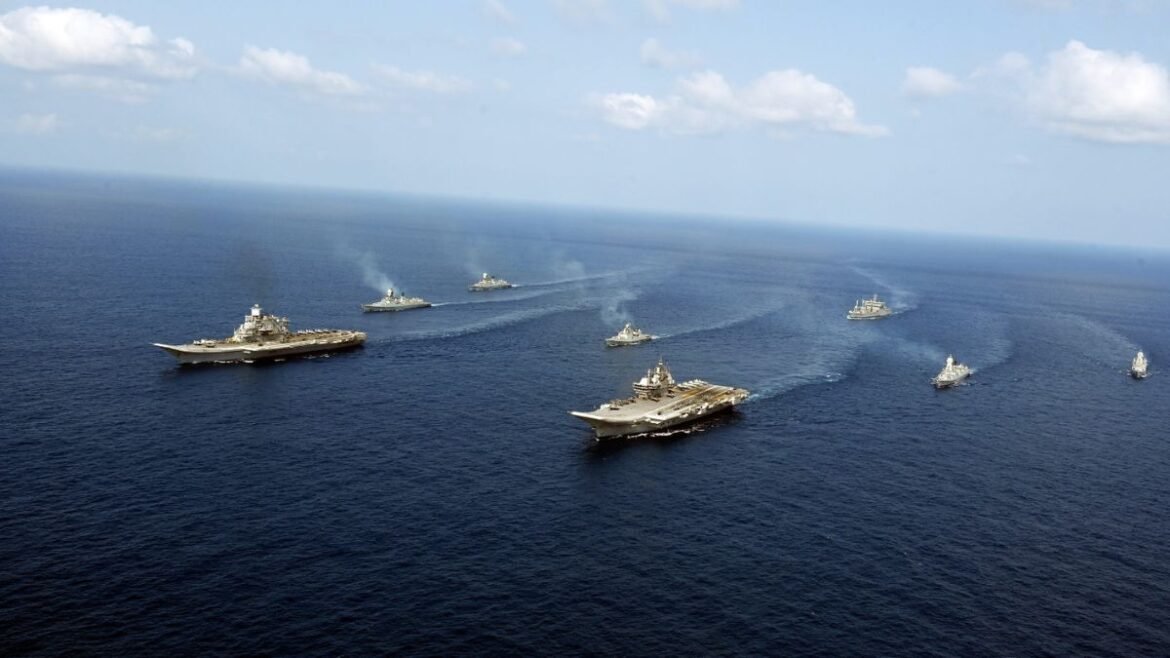Introduction
The 12th edition of the Multilateral Naval Exercise – 2024, codenamed MILAN, conducted in Visakhapatnam from February 19 to 27, 2024, stood out as one with the largest-ever participation, featuring the navies of over fifty countries and nearly twenty ships from friendly nations.
This biennial event, initially launched by the Indian Navy in 1995, began as a part of India’s ‘Look East Policy’, subsequently expanded under the ‘Act East policy’ and further becoming Prime Minister Narendra Modi’s initiative, coined as SAGAR(‘Security and Growth for All in the Region’)has now become a cornerstone of international maritime cooperation. The exercise fulfilled a major aim of fostering collaboration and understanding among navies, emphasizing the importance of a maritime cooperation evolved over almost two decades into a significant multilateral naval exercise.
A final Planning Conference, conducted in a hybrid mode (virtual and in-person), held in Visakhapatnam, presided over by the Chief of Staff Operations, HQ Eastern Naval Command, and was attended by representatives from participating nations, went into the meticulous planning and coordination essential for the success of such a massive naval exercise.
Conduct of MILAN
The harbour phase of MILAN 24 was a diverse array of events, including an International Maritime Seminar, City Parade at RK Beach, Swavlamban Exhibition, Subject Matter Expert Exchange, and Milan of Young Officers. These activities provided a platform for participants to share expertise, showcase capabilities, and strengthen diplomatic ties.
During the sea phase, ships, maritime patrol aircraft, and submarines from Friendly Foreign Countries joined Indian Navy units in a series of manoeuvres. The Eastern seaboard in Visakhapatnam witnessed the deployment of both Indian aircraft carriers, INS Vikramaditya and INS Vikrant, showcasing India’s naval strength and capability.
The exercises during MILAN 2024 involved large-force manoeuvres, Advanced Air Defence Operations, Anti-Submarine Warfare, and Anti-Surface Warfare Operations, demonstrating the participating nations’ commitment to maintaining maritime security in the region.
Shared Responsibility of Maritime Security
The timing of MILAN 2024 which happened to be with India’s G20 Presidency, emphasized the country’s commitment to encouraging and developing global cooperation. The exercise also embodied the G20 theme of ‘Vasudhaiva Kutumbakam’ – the world is one family – showcasing the shared responsibility of nations in ensuring maritime peace and stability.
Ex MILAN, which began in 1995 with just four nations – Indonesia, Singapore, Sri Lanka, and Thailand has blossomed into a robust, multinational forum for maritime cooperation. The previous edition, MILAN 22, held off Visakhapatnam from 25 February to 04 March 2022, involved participation of 39 countries. As MILAN 2024 approached, anticipation began building for an even more significant and impactful event that would undoubtedly contribute to strengthening international maritime partnerships.
What also emerged is that this exercise which began with four countries and reached a participation level of over twelve times that amount is that Indian Navy’s outreach has had a formidable effect on many navies of the world. When militaries exercise together, they come to know about each other’s capabilities. That is how the demand to train with the Indian Navy has been increasing. It has also been a positive catalyst for India in the arena of international relations.
China – Pakistan Naval Exercise
This edition of Ex MILAN became more important in view of the largest ever China-Pakistan Naval Exercise termed as “first joint patrol”, which was held in the Arabian Sea during November 2023. This was the third and the largest edition of Exercise Sea Guardian. The first edition was held in 2020 in the Northern waters of the Arabian Sea, while the second edition was held in 2022 in the waters off Shanghai.
According to Global Times, dated November 16, 2023, the PLA Navy sent a Type 052D Destroyer, two Type 054A Frigates, a Replenishment Ship, a Conventional Submarine and a Submarine Support Ship, while the Pakistan Navy sent at least two Type 054A/P frigates, two F-22P Frigates and an Anti-Submarine Patrol Aircraft, plus Special Forces from both sides.
Explaining the differences between the joint patrol and the sea phase of the joint exercise, Song Zhongping, a Chinese military expert and TV commentator, told the Global Times that a joint patrol is a military presence that allows fast response to emergencies and safeguards security in a region, while a joint exercise is training with preset goals and targets. Song stated that the Arabian Sea is important to both China and Pakistan in terms of goods and energy transport, highlighted by the CPEC (China Pakistan Economic Corridor) that connects the two countries’ economic activities, so it is important for the two countries to safeguard this sea lane from security threats. Song also added that this type of joint naval patrol will likely become routine.


